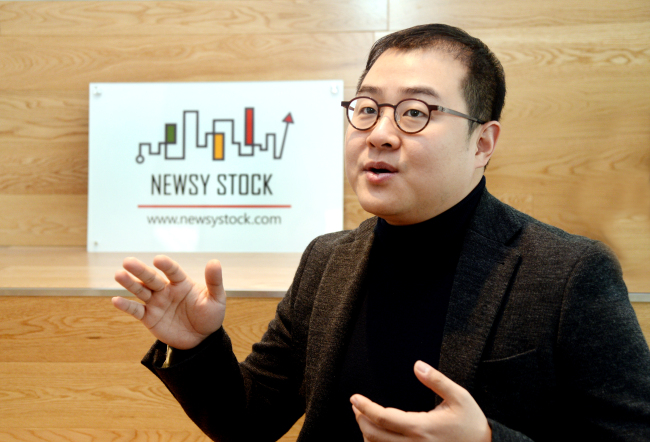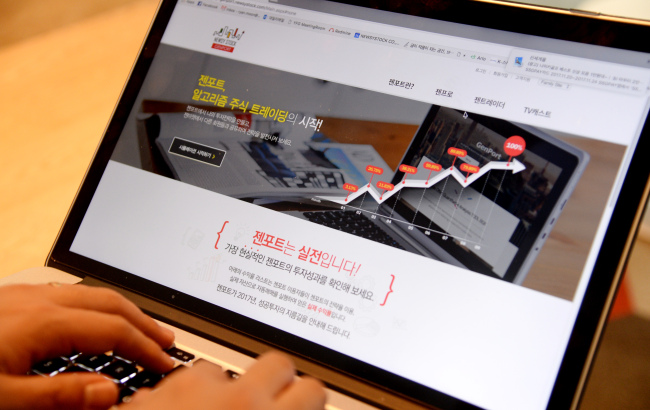The Korea Herald is publishing a series of interviews on promising startups in the fintech industry. This is the seventh installment. — Ed.
Securities firms in South Korea have for the past few years joined the race to lower commission fees -- to nearly zero -- to draw in more retail investors.
But to Ryan Moon, co-founder of Korea’s first robo adviser-powered investment service provider Newsystock, such an approach is off the point, as increasingly sophisticated retail investors here want more than exemptions from commission fees: They want returns from investment.
Alternatives to addressing the shift in the needs of the securities market are robo advisers that offer automated investment portfolios generated either by the firm or by users, Moon said in an interview with The Korea Herald.
 |
Newsystock co-founder and co-chief executive Ryan Moon (Park Hyun-koo/The Korea Herald) |
“What customers want is not a service free of commission fees, but an environment or content that guarantees high returns,” said the 34-year-old entrepreneur and former business strategy consultant.
“The robo adviser platform will quench local retail investors’ thirst (for returns), since they found it unsatisfactory from those of brokerages.”
The Korean equivalent to the United States’ Wealthfront or Betterment, Newsystock offers an artificial intelligence-powered engine called Genport, where nearly 5,000 users, mostly amateur individual investors, can generate their own automated stock portfolios and back-test them an unlimited number of times.
Users may also share their asset allocations on an online platform called Genmarket. Some 20,000 portfolios have been created, while 840 of them are open on the platform.
Comparatively young and highly educated individuals are smart enough to know how to analyze a stock’s growth potential by themselves and generate their own asset mix, according to Moon, by using computer software like Microsoft Excel or by running codes in programming languages such as Python.
“Many retail investors in their 30s and 40s will not buy stocks until they come up with their own analyses or understanding,” Moon said. “The older generations might have either relied on branches of brokerages and private bankers, or learned investment tactics on TV shows and blindly followed.”
To accommodate the needs of individual stock investors who are not what they used to be decades ago, a firm’s agility, dexterity and neutrality are critical to success, Moon said, adding that Newsystock could play that role as a startup.
“Startups have the capacity to make swift changes to services upon customers’ requests, while the same services presented by large companies are slow to reflect customer feedback and are prone to influence by major shareholders,” he said.
One indication that Newsystock works is that those who boasted successful investment portfolios, such as the former head of Nexon Europe Kim Sung-jin and a physician in laboratory medicine nicknamed Systrader79, have even ended up opening online courses on Newsystock’s website.
 |
Newsystock’s service is displayed on a laptop. (Park Hyun-koo/The Korea Herald) |
The services offered by the company are a step forward from a business prototype in 2014 -- a quantitative data-based analysis and recommendation system now known as NewsyRank, which was presented at Draper University, a startup incubator run by US venture capitalist Tim Draper.
Moon Hong-jip, the father of Ryan Moon and another co-founder of Newsystock, was a financial engineering guru. In 1997, he developed Korea’s first home trading system Cybos, operated under Daishin Securities.
After it was founded in June 2011, Newsystock was spurned by venture capitalists until mid-2015, as financial scams were prevalent in Korea in the early 2000s and venture capitalists were reluctant to invest in a startup devoted to financial business.
Newsystock was taken over by Dayli Financial Group, then known as Yello Financial Group, in June 2015.
The startup has provided its AI-run tools to eight brokerages. Now the firm is moving to expand its reach to customers, in part through 700 million won ($659,000) in crowdfunding on Korean platform Wadiz, which wrapped up last month.
By Son Ji-hyoung
(
consnow@heraldcorp.com)








![[Today’s K-pop] Blackpink’s Jennie, Lisa invited to Coachella as solo acts](http://res.heraldm.com/phpwas/restmb_idxmake.php?idx=644&simg=/content/image/2024/11/21/20241121050099_0.jpg)
